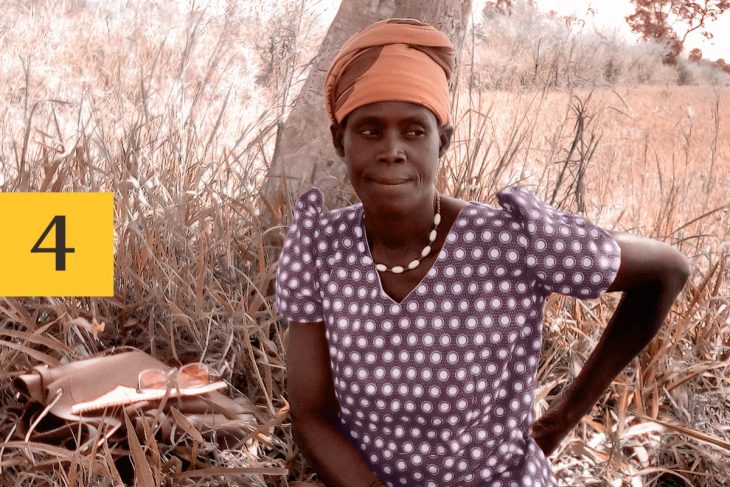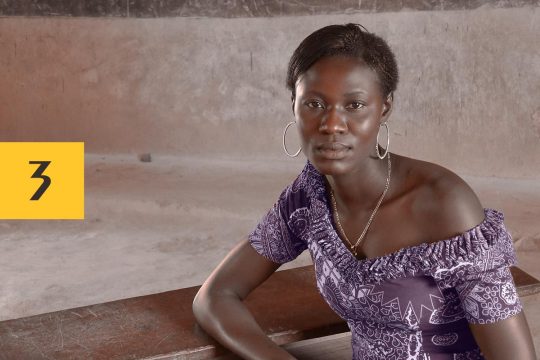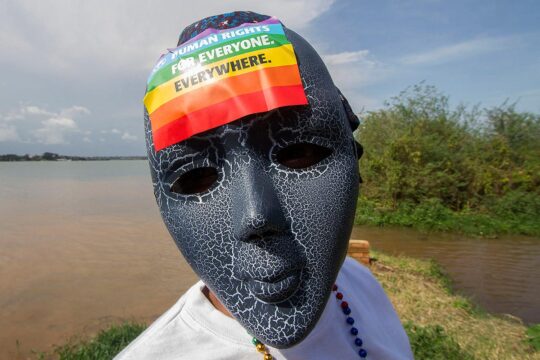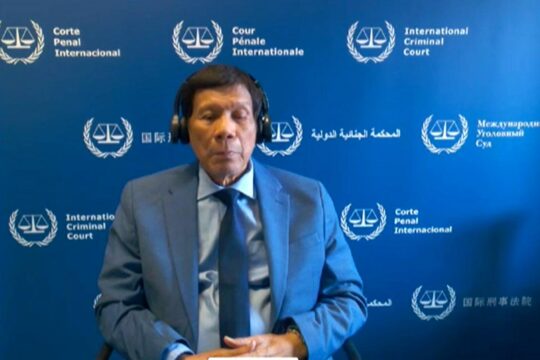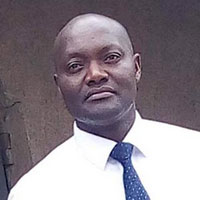In the rural hamlet of Amilobo, Palema parish, Lamogi, about 20km from Northern Uganda’s regional capital city of Gulu, lives Lilly Oyella, 42, her husband Samuel Akera, a peasant farmer, with their seven children in an oval mud and wattle grass thatched house. Oyella’s tiny compound is surrounded by small gardens of yams, sweet potatoes, cassava, simsim, beans, bananas and varieties of other green vegetables – all delicacies in this part of the country –, alongside goats and chicken reared on small pieces of land. This is in the middle of a lush green expansive savanna countryside, astride the main Juba road linking Uganda to its Northern neighbor, South Sudan.
It was in 2002 that the notorious Lord's Resistance Army (LRA) rebels of Joseph Kony first struck Oyella’s village, followed by another attack in 2004. In both incidents Oyella was injured but the second attack was more frightening as she was expecting a baby. Today her trauma is as fresh as if it happened yesterday.
“They surrounded us and beat us seriously even though I was pregnant. I got severe back pain and doctors later discovered that the beatings had damaged my spine,” Oyella told us on a visit to her home last November. “Upon delivery they found the baby had complications. His testicles were swollen and the doctors recommended a surgery. Yet I had no money on me as all we had was lost in the war,” she said.
Ambitious programs
During a weekly market day nearby the Pakiri trading centre, Oyella was introduced in 2015 by a friend to Gulu Women Economic Development and Globalisation (GWED-G), an organization founded by grassroots women who suffered the effects of the LRA in Northern Uganda.
GWED-G was among the six non-for-profit organisations through which the Trust Fund for Victims (TFV) of the International Criminal Court (ICC), acting under the assistance mandate, has been delivering assistance and rehabilitation to victims across 18 districts in Northern Uganda, providing services to victims of crimes against humanity and war crimes through a network of local and international NGOs. From 2015 to 2018 the TFV entered into a partnership with GWED-G; Amuria District Development Agency (ADDA); Ayira Health Services (AHS); Center for Children in Vulnerable Situations (CCVS); North East Chili Producers Association (NECPA) and Transcultural Psychosocial Organization (TPO), all present in Northern Uganda. Five of the six projects received funding earmarked for activities that also addressed the harm suffered by survivors of sexual and gender-based violence. The selected organisations were to provide rehabilitative services such as medical services for victim survivors of sexual violence; trauma counseling and psychological support services; reconstructive plastic surgery to rehabilitate facial, head, and burn injuries; orthopedic surgical services; fitting and repair of prosthetic and orthotic devices; physiotherapy; corrective surgery to remove foreign objects such as bullets or shrapnel; post-burn contracture surgery and physiotherapy; victim patient community mobilization initiatives; and referrals for post-operative care and follow-up.
In addition to these aims of expanding access to rehabilitative surgical and medical services as well as enhancing access to psychological rehabilitation support, the TFV supported reconciliation and healing at the community level through sensitization and awareness raising campaigns to reduce the added stigma and discrimination that victims of grave human rights abuses often endure. The 2015 portfolio for all these projects amounted to 735,000 euros, according to the official figures by the Trust Fund.
Paying the bills
Oyella and her son Sam Ojok – now 14 years old and attending the nearby local primary school – received medical treatment at Lacor Hospital in Gulu where she and Ojok underwent a spinal and a testicular surgery, respectively. “GWED-G paid the medical bills for my son and myself including transport to and fro the hospital,” she adds.
Just like another Trust Fund beneficiary, Wilson Kweya, 68, a retired store keeper at the Uganda National Parks, and many others like them including those who declined to be interviewed for this publication for fear of losing future assistance, Oyella said they did not know how much in total the Trust Fund had spent on their medical bills.
Kweya was shot several times during an attack by the rebels. The toes on his right leg are disfigured, a huge scar is visible below the knee and a wound oozing with a purse are signs of the agony this man goes through daily, a misery he attributes to the LRA attack. “What we wanted most is getting healed, not how much was spent on my medical bills. It must have been a transparent system. Otherwise if they [the Trust Fund and its implementers] were not transparent, we wouldn’t be treated,” Kweya said.
“Our beneficiaries were informed of the cost of treatment and support,” said Bosco Ezangu, GWED-G’s former Trust Fund manager and now the organization’s human rights monitor, contradicting some of the beneficiaries. Ezangu said that as part of accountability, beneficiaries were made to pick medical bill forms which they signed upon receiving treatment, and a claim would be lodged monthly by the partner hospitals. “In addition we give them seeds, live goats, as livelihood incentives” Ezangu added.
"The Trust Fund did a commendable job"
Kweya, a father of nine, said with the TFV no more, his relentless pain would remain. He meant that he was happy that he had been treated but disappointed that the project stopped as he was supposed to continue receiving treatment until he got better.
GWED-G Executive Director Pamela Judith Angwech said that by the time the Trust Fund stopped, the organization had handled over 1780 limb replacements in the three years the Trust Fund supported the programmes at Gwed-D. “We handled many complicated cases which ranged between 6-30 million Uganda shillings [USD1,630 to USD8,100] per patient. Hip replacement was the most expensive and cost about 30 million. Grants from the Trust Fund ranged between Ugshs300million [about USD82,000] to Ugshs700million [about USD170,000] whenever there was a call by the Trust Fund for expression of interest. However much we appreciate such great support from the Trust Fund, the money was still little given that we worked in only six districts and wanted to have more. About 800 war-affected persons, some who have benefitted under the project and are supposed to receive more assistance have been left unattended following the winding up of the project,” Angwech said. According to her, by the time the project wound up, GWED-G had received Ugshs2billion (about USD540,000).

Ezangu, Angwech as well as Gulu district chairman, Ojara Mapinduzi, who is the most senior politician of a district with about 400,000 people, spoke highly about the project and had no doubt that it met its desired mission. “The Trust Fund did a commendable job. It benefitted hundreds of our people who lost their limbs and livelihoods,” Mapinduzi said.
“A good public relations role for the ICC”
Martin Aliker, an independent researcher and analyst worked with several NGOs which carry out similar activities. To him, the Trust Fund duplicated programmes that other non-for profit organisations had done in the once troubled region. “The Trust Fund operated like any other ordinary not-for-profit organization,” said Aliker, who is a resident in Gulu. “From the onset, the Trust Fund’s definition of war victims was limited. Where do they leave homeless children who are on the streets? There is a direct connection between the war and the children on the streets or families whose family members went missing as a result of the war,” he stressed. “The Trust Fund focused only on the highly publicized cases, and on not-for profit organizations that operated on those areas before the Trust Fund. It failed to make a difference for the neglected cases, resulting into duplication of programmes,” he added.
“The Trust Fund’s choice of interventions made it impossible to see the impact. For instance how do you verify impact on psychosocial support they gave to the victims? Do you say: this victim is more or less traumatized than before the Trust Fund intervened?” he asked. “The Trust Fund offered training for economic livelihood interventions without accessing the real needs of the victims. For instance you are giving entrepreneurship skills but he or she does not have the seed money. Even if they are given seed money, the victims have biting needs like putting food on the table that makes them use the seed money for immediate needs,” he added. “The Trust fund served as a good public relations role for the ICC. It helped in control and management of their expectations – emphatically gave them false hope,” he said.
“While the Trust Fund was helpful to those who needed medical assistance like limb replacements, it failed to have a follow-up mechanism to replace, repair and construct the lives of these victims,” Aliker added. “All is not lost with the Trust Fund: some people have benefitted in getting medical care and some small livelihood support. A good day today is better than a bad day tomorrow” he added.


